有效沟通的技巧中英文
- 格式:pptx
- 大小:279.58 KB
- 文档页数:41
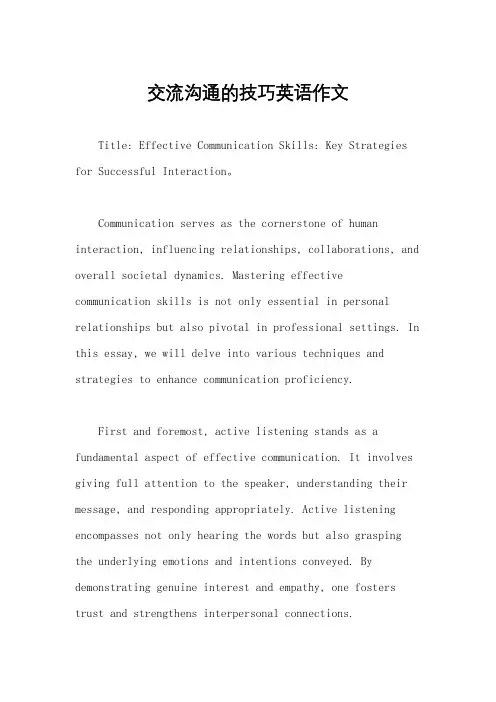
交流沟通的技巧英语作文Title: Effective Communication Skills: Key Strategies for Successful Interaction。
Communication serves as the cornerstone of human interaction, influencing relationships, collaborations, and overall societal dynamics. Mastering effective communication skills is not only essential in personal relationships but also pivotal in professional settings. In this essay, we will delve into various techniques and strategies to enhance communication proficiency.First and foremost, active listening stands as a fundamental aspect of effective communication. It involves giving full attention to the speaker, understanding their message, and responding appropriately. Active listening encompasses not only hearing the words but also grasping the underlying emotions and intentions conveyed. By demonstrating genuine interest and empathy, one fosters trust and strengthens interpersonal connections.Moreover, clarity and conciseness in expression play a pivotal role in effective communication. Communicating ideas succinctly and articulately ensures that the message is easily comprehensible to the recipient. Avoiding jargon and unnecessary complexity prevents misinterpretation and facilitates smoother exchanges. Additionally, organizing thoughts logically and structuring communication in a coherent manner enhances clarity and fosters understanding.Nonverbal communication, often overlooked yet immensely powerful, significantly influences interpersonal dynamics. Body language, facial expressions, gestures, and tone of voice convey subtle cues that complement verbal messages. Being mindful of nonverbal signals and aligning them with verbal communication enhances credibility and reinforces the intended message. Maintaining eye contact, adopting an open posture, and mirroring the body language of the interlocutor establish rapport and facilitate effective communication.Furthermore, empathy and emotional intelligence areindispensable in fostering meaningful connections and resolving conflicts amicably. Understanding others' perspectives, acknowledging their feelings, and responding with empathy cultivates trust and mutual respect. Emotional intelligence enables individuals to navigate interpersonal challenges adeptly, recognize emotional triggers, and regulate their own emotions effectively. By fostering an emotionally supportive environment, one fosters open communication and collaboration.Cultural sensitivity and awareness are imperative in today's interconnected world, where interactions span diverse cultural backgrounds. Recognizing cultural nuances, norms, and communication styles prevents misunderstandings and fosters inclusive dialogue. Embracing diversity and demonstrating respect for cultural differences enriches communication experiences and promotes cross-cultural understanding. Additionally, adapting communication strategies to accommodate cultural diversity demonstrates flexibility and enhances interpersonal effectiveness.Effective communication also entails the skillfulmanagement of conflicts and disagreements. Rather than avoiding or escalating conflicts, addressing them constructively promotes mutual understanding and strengthens relationships. Active listening, empathy, and assertiveness are key in navigating conflictsdiplomatically and reaching mutually satisfactory resolutions. By fostering a collaborative problem-solving approach, conflicts can be transformed into opportunities for growth and reconciliation.Moreover, fostering a culture of constructive feedback facilitates continuous improvement and professional growth. Providing specific, actionable feedback in a supportive manner enables individuals to enhance their performance and refine their communication skills. Conversely, receiving feedback gracefully and utilizing it to self-reflect and adapt fosters personal development and enhances communication proficiency.In conclusion, effective communication skills are indispensable in navigating interpersonal relationships, fostering collaboration, and achieving success in bothpersonal and professional spheres. By cultivating active listening, clarity in expression, nonverbal communication proficiency, empathy, cultural awareness, conflict resolution skills, and a culture of constructive feedback, individuals can elevate their communication effectiveness and cultivate harmonious interactions. As we continue to navigate an increasingly interconnected world, mastering these communication strategies becomes ever more essential in fostering understanding, empathy, and cooperation across diverse contexts and cultures.。
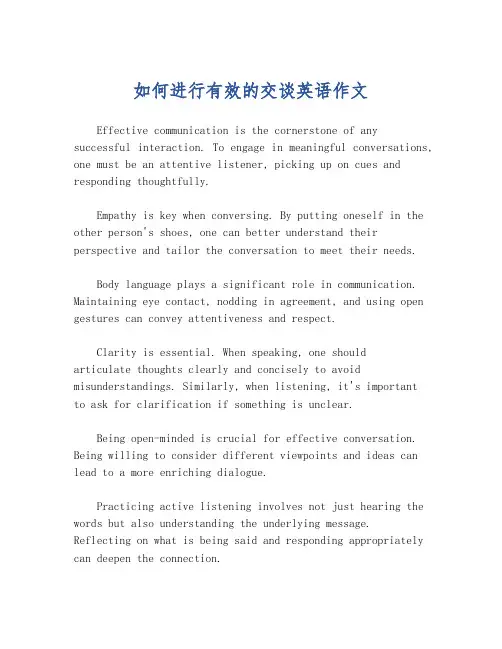
如何进行有效的交谈英语作文Effective communication is the cornerstone of any successful interaction. To engage in meaningful conversations, one must be an attentive listener, picking up on cues and responding thoughtfully.Empathy is key when conversing. By putting oneself in the other person's shoes, one can better understand their perspective and tailor the conversation to meet their needs.Body language plays a significant role in communication. Maintaining eye contact, nodding in agreement, and using open gestures can convey attentiveness and respect.Clarity is essential. When speaking, one shouldarticulate thoughts clearly and concisely to avoid misunderstandings. Similarly, when listening, it's importantto ask for clarification if something is unclear.Being open-minded is crucial for effective conversation. Being willing to consider different viewpoints and ideas can lead to a more enriching dialogue.Practicing active listening involves not just hearing the words but also understanding the underlying message.Reflecting on what is being said and responding appropriately can deepen the connection.In the digital age, written communication is also a form of conversation. Using proper grammar and punctuation, along with a respectful tone, can make online interactions more effective.Lastly, the art of conversation is a skill that can be honed over time. Continuous practice, feedback, and self-reflection can greatly improve one's ability to communicate effectively.In summary, effective conversation is a blend of active listening, empathy, clear expression, and open-mindedness. By mastering these elements, one can foster deeper connections and more productive dialogues.。
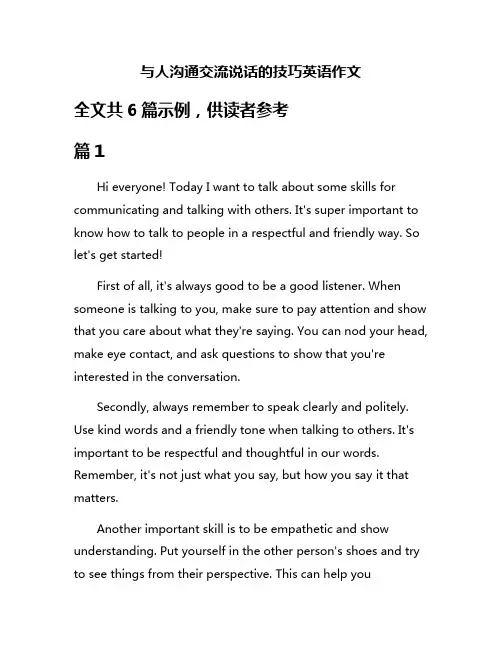
与人沟通交流说话的技巧英语作文全文共6篇示例,供读者参考篇1Hi everyone! Today I want to talk about some skills for communicating and talking with others. It's super important to know how to talk to people in a respectful and friendly way. So let's get started!First of all, it's always good to be a good listener. When someone is talking to you, make sure to pay attention and show that you care about what they're saying. You can nod your head, make eye contact, and ask questions to show that you're interested in the conversation.Secondly, always remember to speak clearly and politely. Use kind words and a friendly tone when talking to others. It's important to be respectful and thoughtful in our words. Remember, it's not just what you say, but how you say it that matters.Another important skill is to be empathetic and show understanding. Put yourself in the other person's shoes and try to see things from their perspective. This can help youcommunicate better and build stronger relationships with others.Lastly, don't be afraid to ask for clarification if you don't understand something. It's better to ask questions and make sure you understand than to pretend you know what's going on. Communication is a two-way street, so don't be afraid to speak up and share your thoughts and feelings.In conclusion, good communication skills are key to building strong relationships and connecting with others. Remember to listen, speak clearly and politely, show empathy, and ask questions when needed. With these skills, you'll be a great communicator in no time. Thanks for reading and happy communicating!篇2Hello everyone, today I want to talk about some tips for communicating and talking with others. It's really important to be able to express ourselves clearly and understand what others are saying. So let's get started!First of all, it's really important to listen carefully when someone is talking to you. Try to focus on what they are saying and really pay attention to their words. Don't interrupt them ortry to finish their sentences for them. Let them speak and then respond to what they said.Secondly, it's important to use eye contact and body language when you are talking to someone. This shows that you are engaged in the conversation and interested in what they have to say. It also helps to show that you are confident and respectful towards the other person.Another important tip is to speak clearly and at a good pace. Make sure your words are easy to understand and that you are not talking too fast or too slow. If you are not sure about something, don't be afraid to ask for clarification or to repeat what was said.Lastly, always be polite and respectful when talking to others. Treat them the way you would like to be treated and avoid saying anything hurtful or disrespectful. Remember that communication is a two-way street, so be open to hearing other people's opinions and thoughts.By following these tips, you will be able to communicate effectively and build positive relationships with others. So practice these skills and remember to always be a good listener and speaker. Thank you for listening to my tips on communication!篇3Hello everyone! Today I'm going to talk about some tips on how to communicate and talk with others in English. Communication is really important because it helps us to express our thoughts and feelings, as well as understand others better.First of all, it's important to listen carefully to what the other person is saying. Don't interrupt them and try to show interest in what they are talking about. You can nod your head or say "I see" or "That's interesting" to show that you are paying attention.Secondly, it's important to speak clearly and politely. Use simple and easy-to-understand words so that the other person can understand you better. Also, try to use polite phrases like "please" and "thank you" to show respect.Another tip is to ask questions. This shows that you are interested in the conversation and want to learn more. You can ask questions like "What do you mean?" or "Can you explain that again?" to clarify things that you don't understand.Lastly, don't be afraid to express your own opinions and feelings. Remember that communication is a two-way street, so it's important to share your thoughts as well. Just make sure to be respectful and open-minded when expressing yourself.In conclusion, communication is a vital skill that we all need to master. By using these simple tips, you can improve your communication skills and have better conversations with others. So remember to listen, speak clearly, ask questions, and express yourself confidently. Happy talking!篇4Hey guys, do you want to know some tips on how to communicate with people effectively? Well, I have some great ideas to share with you.First of all, when talking to someone, it’s important to listen carefully. Don’t just think about what you want to say next, really pay attention to what the other person is saying. You can show that you’re listening by nodding your head or making eye contact.Secondly, it’s good to ask questions. This shows that you’re interested in what the other person has to say. You can ask about their day, their interests, or anything else you’re curious about. People love to talk about themselves, so asking questions is a great way to keep the conversation going.Another tip is to stay positive. Nobody likes to talk to someone who is always complaining or being negative. Instead,try to focus on the good things in life and keep the conversation light and upbeat.Lastly, remember to be respectful. Treat others the way you would like to be treated. Use polite words like “please” and “thank you”, and always be kind and considerate.By following these tips, you’ll be sure to have great conversations with all kinds of people. So go out there and practice your communication skills! Good luck!篇5Hey guys, today I want to talk about some tips on how to communicate with others. It's super important to be able to talk and listen to people in a good way!First of all, when you talk to someone, make sure to look at them and smile. It shows that you are interested in what they have to say. And don't forget to use nice words like "please" and "thank you". It makes the other person feel respected and happy.Secondly, try to listen carefully when someone is talking to you. Don't interrupt or talk over them. It's important to give them a chance to speak their mind. Also, ask questions to show that you are interested and paying attention.Thirdly, be honest and kind when you communicate with others. If you have a different opinion, it's okay to say it, but do it in a respectful way. Remember, everyone has their own thoughts and feelings, so it's important to be understanding and accepting.Lastly, practice good communication skills every day. Talk to your friends, family, and even strangers. The more you practice, the better you will get at it. And remember, communication is a two-way street, so be ready to listen as much as you talk.So, that's it for today! I hope you guys learned some tips on how to communicate with others. Remember, it's all about being friendly, respectful, and understanding. Have fun talking to people and making new friends! Bye!篇6Hey guys, today I'm gonna talk about how to communicate with others in English. It's super important to know some tips and tricks to make your conversations smooth and easy.First of all, always remember to listen carefully when someone is speaking. It's not just about waiting for your turn to talk, it's about really paying attention to what the other person is saying. This shows that you care about what they have to say.Secondly, don't be afraid to ask questions if you don't understand something. It's totally okay to ask for clarification, and it actually shows that you are engaged in the conversation and want to learn more.Another tip is to use gestures and facial expressions to help express yourself. Sometimes words can be tricky, so using body language can really help get your point across.Also, try to speak clearly and at a good pace. Don't mumble or talk too fast, as this can make it difficult for the other person to understand you.Lastly, always be polite and respectful in your conversations. Treat others the way you want to be treated and remember to say "please" and "thank you" whenever necessary.With these tips in mind, you'll be a pro at communicating in English in no time! Just remember to practice and don't be afraid to make mistakes. It's all part of the learning process. Good luck!。
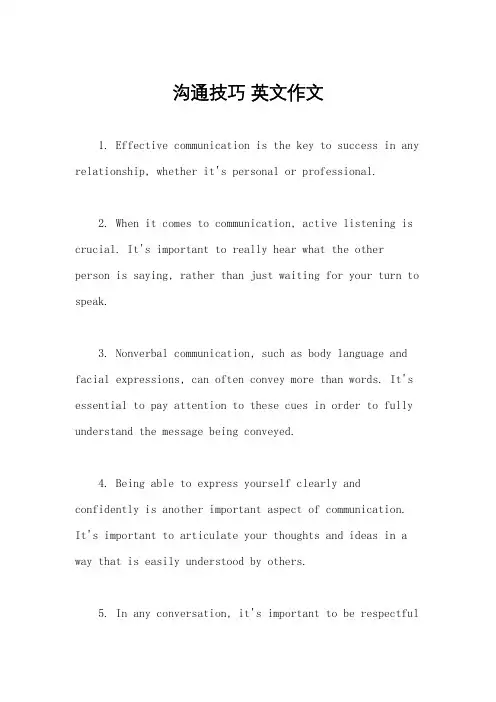
沟通技巧英文作文1. Effective communication is the key to success in any relationship, whether it's personal or professional.2. When it comes to communication, active listening is crucial. It's important to really hear what the other person is saying, rather than just waiting for your turn to speak.3. Nonverbal communication, such as body language and facial expressions, can often convey more than words. It's essential to pay attention to these cues in order to fully understand the message being conveyed.4. Being able to express yourself clearly and confidently is another important aspect of communication.It's important to articulate your thoughts and ideas in a way that is easily understood by others.5. In any conversation, it's important to be respectfuland considerate of the other person's feelings and opinions. This means avoiding interrupting, judging, or dismissing their thoughts.6. Conflict resolution is a key part of effective communication. It's important to be able to address and resolve conflicts in a calm and respectful manner, rather than letting them escalate.7. In a professional setting, it's important to be able to communicate assertively, expressing your needs and opinions while still respecting those of others.8. Finally, it's important to be open to feedback and willing to adapt your communication style in order tobetter connect with others. This flexibility andwillingness to learn is essential for effective communication.。
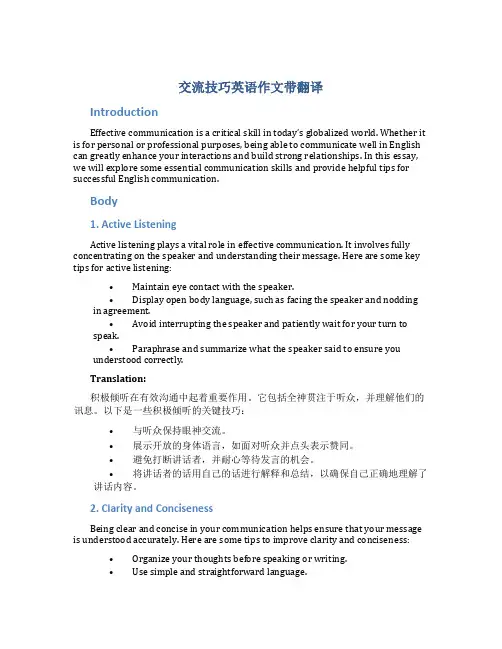
交流技巧英语作文带翻译IntroductionEffective communication is a critical skill in today’s globalized world. Whether it is for personal or professional purposes, being able to communicate well in English can greatly enhance your interactions and build strong relationships. In this essay, we will explore some essential communication skills and provide helpful tips for successful English communication.Body1. Active ListeningActive listening plays a vital role in effective communication. It involves fully concentrating on the speaker and understanding their message. Here are some key tips for active listening:•Maintain eye contact with the speaker.•Display open body language, such as facing the speaker and nodding in agreement.•Avoid interrupting the speaker and patiently wait for your turn to speak.•Paraphrase and summarize what the speaker said to ensure you understood correctly.Translation:积极倾听在有效沟通中起着重要作用。
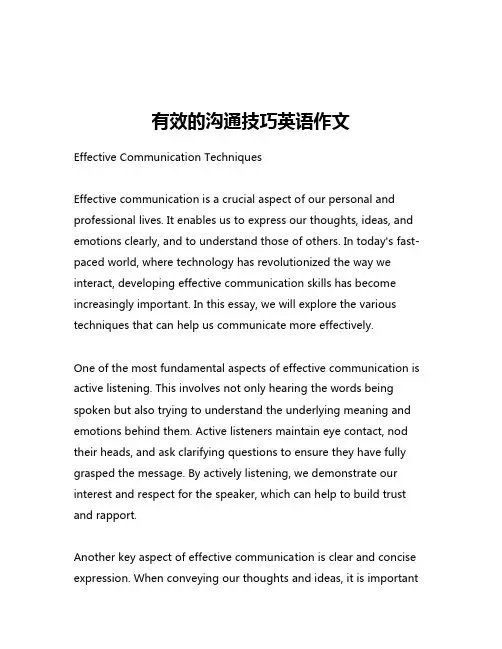
有效的沟通技巧英语作文Effective Communication TechniquesEffective communication is a crucial aspect of our personal and professional lives. It enables us to express our thoughts, ideas, and emotions clearly, and to understand those of others. In today's fast-paced world, where technology has revolutionized the way we interact, developing effective communication skills has become increasingly important. In this essay, we will explore the various techniques that can help us communicate more effectively.One of the most fundamental aspects of effective communication is active listening. This involves not only hearing the words being spoken but also trying to understand the underlying meaning and emotions behind them. Active listeners maintain eye contact, nod their heads, and ask clarifying questions to ensure they have fully grasped the message. By actively listening, we demonstrate our interest and respect for the speaker, which can help to build trust and rapport.Another key aspect of effective communication is clear and concise expression. When conveying our thoughts and ideas, it is importantto use simple, straightforward language that is easy for the listener to understand. Avoid using jargon or technical terms unless necessary, and be mindful of the audience's level of understanding. Additionally, it is important to organize our thoughts and ideas in a logical and coherent manner, so that the message flows naturally and is easy to follow.Nonverbal communication is also an essential component of effective communication. Our body language, facial expressions, and tone of voice can all convey important information and can either enhance or undermine the message we are trying to communicate. For example, maintaining an open and confident posture, making eye contact, and using a warm and engaging tone of voice can help to establish a positive rapport with the listener.Effective communication also requires the ability to adapt our communication style to different situations and audiences. In a formal business setting, for instance, a more professional and reserved communication style may be appropriate, while in a casual social setting, a more informal and relaxed style may be more suitable. By being flexible and adaptable, we can ensure that our message is received and understood effectively.One of the key challenges of effective communication in today's digital age is the prevalence of technological tools such as email, textmessaging, and video conferencing. While these tools can be incredibly useful, they can also create barriers to effective communication if not used properly. For example, it is important to be mindful of tone and body language when communicating through these channels, and to avoid misunderstandings that can arise from a lack of face-to-face interaction.Another important aspect of effective communication is the ability to manage conflict. Disagreements and misunderstandings are inevitable in any relationship or workplace, and the way we handle them can have a significant impact on the outcome. Effective communicators approach conflict with a spirit of openness and understanding, seeking to find common ground and find mutually satisfactory solutions.Finally, effective communication requires ongoing practice and self-reflection. By regularly evaluating our communication skills and seeking feedback from others, we can identify areas for improvement and continue to develop our abilities over time. This may involve taking communication-focused workshops or classes, or simply being mindful of our communication patterns in everyday interactions.In conclusion, effective communication is a critical skill that can have a profound impact on our personal and professional lives. Bymastering techniques such as active listening, clear expression, nonverbal communication, adaptability, and conflict management, we can become more effective communicators and build stronger, more meaningful relationships with those around us.。
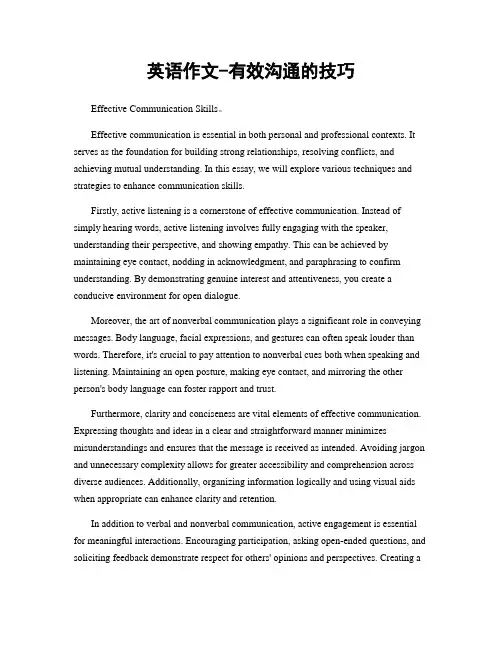
英语作文-有效沟通的技巧Effective Communication Skills。
Effective communication is essential in both personal and professional contexts. It serves as the foundation for building strong relationships, resolving conflicts, and achieving mutual understanding. In this essay, we will explore various techniques and strategies to enhance communication skills.Firstly, active listening is a cornerstone of effective communication. Instead of simply hearing words, active listening involves fully engaging with the speaker, understanding their perspective, and showing empathy. This can be achieved by maintaining eye contact, nodding in acknowledgment, and paraphrasing to confirm understanding. By demonstrating genuine interest and attentiveness, you create a conducive environment for open dialogue.Moreover, the art of nonverbal communication plays a significant role in conveying messages. Body language, facial expressions, and gestures can often speak louder than words. Therefore, it's crucial to pay attention to nonverbal cues both when speaking and listening. Maintaining an open posture, making eye contact, and mirroring the other person's body language can foster rapport and trust.Furthermore, clarity and conciseness are vital elements of effective communication. Expressing thoughts and ideas in a clear and straightforward manner minimizes misunderstandings and ensures that the message is received as intended. Avoiding jargon and unnecessary complexity allows for greater accessibility and comprehension across diverse audiences. Additionally, organizing information logically and using visual aids when appropriate can enhance clarity and retention.In addition to verbal and nonverbal communication, active engagement is essential for meaningful interactions. Encouraging participation, asking open-ended questions, and soliciting feedback demonstrate respect for others' opinions and perspectives. Creating asafe and inclusive space where everyone feels valued and heard fosters collaboration and innovation.Furthermore, empathy and emotional intelligence are indispensable qualities for effective communication. Being able to understand and empathize with others' emotions enables you to respond appropriately and build trust and rapport. Acknowledging feelings, validating concerns, and offering support demonstrate empathy and strengthen interpersonal connections.Additionally, adaptability and flexibility are crucial for navigating diverse communication styles and situations. Being able to adjust your communication approach based on the context, audience, and objectives ensures relevance and effectiveness. Whether it's tailoring your language to resonate with different cultural backgrounds or modifying your delivery to suit various personality types, adaptability enhances communication outcomes.Lastly, conflict resolution skills are essential for managing disagreements and maintaining harmonious relationships. Instead of avoiding or escalating conflicts, effective communicators seek to understand the root causes, actively listen to all parties involved, and collaborate on finding mutually beneficial solutions. By fostering open dialogue, promoting empathy, and practicing compromise, conflicts can be resolved constructively, fostering stronger relationships and fostering a positive work environment.In conclusion, effective communication skills are indispensable for success in both personal and professional spheres. By cultivating active listening, mastering nonverbal communication, prioritizing clarity and conciseness, fostering engagement and empathy, embracing adaptability, and honing conflict resolution skills, individuals can enhance their communication abilities and build stronger connections with others. Ultimately, by striving for effective communication, we can foster understanding, cooperation, and harmony in our interactions.。
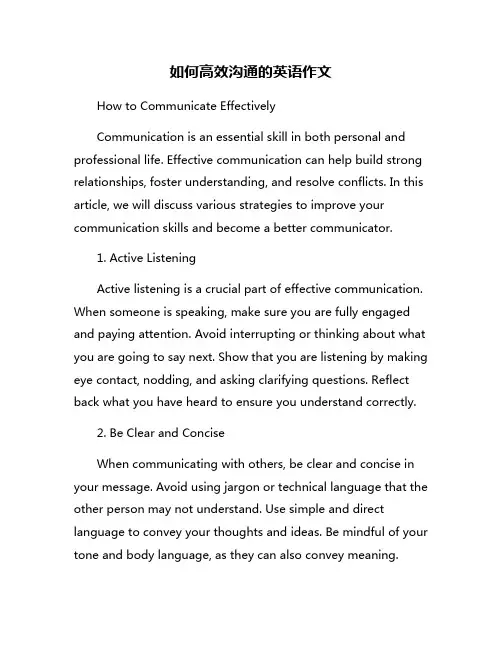
如何高效沟通的英语作文How to Communicate EffectivelyCommunication is an essential skill in both personal and professional life. Effective communication can help build strong relationships, foster understanding, and resolve conflicts. In this article, we will discuss various strategies to improve your communication skills and become a better communicator.1. Active ListeningActive listening is a crucial part of effective communication. When someone is speaking, make sure you are fully engaged and paying attention. Avoid interrupting or thinking about what you are going to say next. Show that you are listening by making eye contact, nodding, and asking clarifying questions. Reflect back what you have heard to ensure you understand correctly.2. Be Clear and ConciseWhen communicating with others, be clear and concise in your message. Avoid using jargon or technical language that the other person may not understand. Use simple and direct language to convey your thoughts and ideas. Be mindful of your tone and body language, as they can also convey meaning.3. Provide FeedbackFeedback is essential for effective communication. Provide constructive feedback to others in a respectful and supportive manner. Be specific about what you liked or didn't like about their message and offer suggestions for improvement. Acknowledge their efforts and provide encouragement.4. Empathy and UnderstandingEmpathy is the ability to understand and share the feelings of another person. By showing empathy, you can build trust and rapport with others. Try to see things from the other person's perspective and validate their emotions. Acknowledge their feelings and respond with kindness and compassion.5. Use Nonverbal CommunicationNonverbal communication, such as facial expressions, gestures, and body language, can often convey more meaning than words alone. Pay attention to your nonverbal cues and those of the person you are communicating with. Maintain eye contact, smile, and use open body language to show that you are engaged and interested.6. Be Patient and UnderstandingEffective communication takes time and effort. Be patient with yourself and others as you work to improve your communication skills. Understand that misunderstandings may occur, and be willing to work through them together. Practice active listening, empathy, and clear communication to enhance your relationships.7. Practice and Seek FeedbackLike any skill, communication improves with practice. Take every opportunity to communicate with others, whether in person, over the phone, or through written communication. Seek feedback from friends, family, or colleagues on how you can improve your communication skills. Be open to constructive criticism and use it to grow and develop as a communicator.In conclusion, effective communication is essential for building strong relationships and resolving conflicts. By practicing active listening, being clear and concise, providing feedback, showing empathy, using nonverbal communication, being patient and understanding, and seeking feedback, you can become a more effective communicator. Remember that communication is a two-way street, and it requires effort from both parties to ensure understanding and mutual respect.。
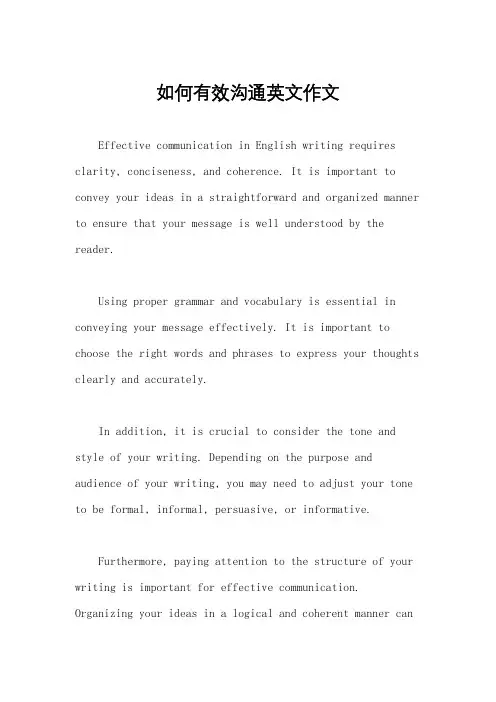
如何有效沟通英文作文Effective communication in English writing requires clarity, conciseness, and coherence. It is important to convey your ideas in a straightforward and organized manner to ensure that your message is well understood by the reader.Using proper grammar and vocabulary is essential in conveying your message effectively. It is important to choose the right words and phrases to express your thoughts clearly and accurately.In addition, it is crucial to consider the tone and style of your writing. Depending on the purpose and audience of your writing, you may need to adjust your tone to be formal, informal, persuasive, or informative.Furthermore, paying attention to the structure of your writing is important for effective communication. Organizing your ideas in a logical and coherent manner canhelp the reader follow your thoughts and understand your message more easily.Moreover, using examples, anecdotes, or evidence to support your points can make your writing more persuasive and engaging. Providing relevant and compelling evidence can help to strengthen your arguments and make your writing more convincing.Finally, it is important to be mindful of the cultural and social context in which you are communicating. Being aware of cultural differences and sensitivities can help you avoid misunderstandings and communicate moreeffectively with people from diverse backgrounds.。
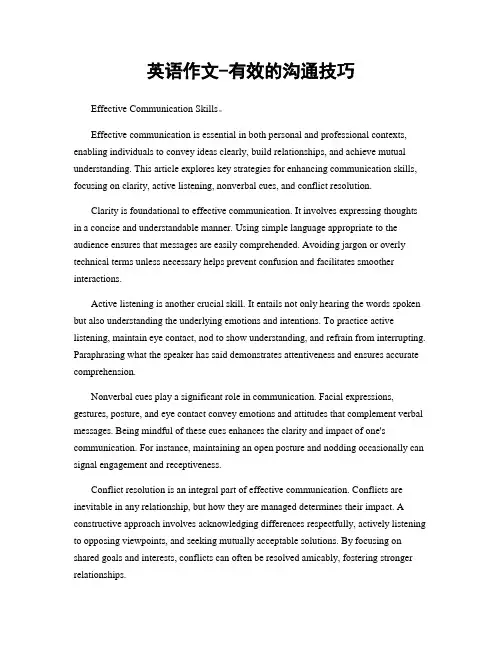
英语作文-有效的沟通技巧Effective Communication Skills。
Effective communication is essential in both personal and professional contexts, enabling individuals to convey ideas clearly, build relationships, and achieve mutual understanding. This article explores key strategies for enhancing communication skills, focusing on clarity, active listening, nonverbal cues, and conflict resolution.Clarity is foundational to effective communication. It involves expressing thoughts in a concise and understandable manner. Using simple language appropriate to the audience ensures that messages are easily comprehended. Avoiding jargon or overly technical terms unless necessary helps prevent confusion and facilitates smoother interactions.Active listening is another crucial skill. It entails not only hearing the words spoken but also understanding the underlying emotions and intentions. To practice active listening, maintain eye contact, nod to show understanding, and refrain from interrupting. Paraphrasing what the speaker has said demonstrates attentiveness and ensures accurate comprehension.Nonverbal cues play a significant role in communication. Facial expressions, gestures, posture, and eye contact convey emotions and attitudes that complement verbal messages. Being mindful of these cues enhances the clarity and impact of one's communication. For instance, maintaining an open posture and nodding occasionally can signal engagement and receptiveness.Conflict resolution is an integral part of effective communication. Conflicts are inevitable in any relationship, but how they are managed determines their impact. A constructive approach involves acknowledging differences respectfully, actively listening to opposing viewpoints, and seeking mutually acceptable solutions. By focusing on shared goals and interests, conflicts can often be resolved amicably, fostering stronger relationships.Moreover, adapting communication style to different situations and audiences enhances effectiveness. For example, formal settings may require more structured and respectful language, whereas informal settings permit a more relaxed approach. Understanding cultural norms and preferences also contributes to successful cross-cultural communication, promoting inclusivity and mutual respect.Furthermore, feedback mechanisms are vital for improving communication skills. Seeking feedback from peers, mentors, or supervisors provides valuable insights into areas for improvement. Being open to constructive criticism and actively working on identified weaknesses cultivates continuous growth and development.In conclusion, mastering effective communication skills is instrumental in achieving personal and professional success. By prioritizing clarity, active listening, awareness of nonverbal cues, conflict resolution, adaptability, and feedback, individuals can cultivate meaningful relationships, foster collaboration, and navigate challenges more effectively. Continuous practice and self-reflection are key to honing these skills, ensuring ongoing improvement and relevance in an increasingly interconnected world.By consistently applying these principles, individuals can build a reputation for clear, respectful, and impactful communication, thereby enhancing their overall effectiveness and influence in various spheres of life.。
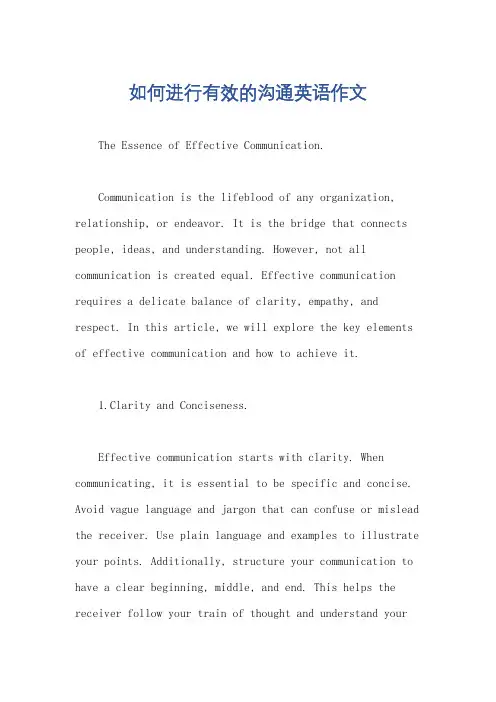
如何进行有效的沟通英语作文The Essence of Effective Communication.Communication is the lifeblood of any organization, relationship, or endeavor. It is the bridge that connects people, ideas, and understanding. However, not all communication is created equal. Effective communication requires a delicate balance of clarity, empathy, and respect. In this article, we will explore the key elements of effective communication and how to achieve it.1.Clarity and Conciseness.Effective communication starts with clarity. When communicating, it is essential to be specific and concise. Avoid vague language and jargon that can confuse or mislead the receiver. Use plain language and examples to illustrate your points. Additionally, structure your communication to have a clear beginning, middle, and end. This helps the receiver follow your train of thought and understand yourmessage more easily.2.Listening Skills.Effective communication is not just about speaking; it is also about listening. Active listening involves paying attention to what the other person is saying, understanding their perspective, and responding appropriately. It is essential to avoid interrupting or jumping to conclusions. Instead, allow the other person to finish their thoughts and ask clarifying questions if needed. This not only respects their viewpoint but also helps you understandtheir needs and concerns better.3.Empathy and Understanding.Effective communication requires empathy and understanding. Put yourself in the other person's shoes and try to see things from their perspective. This helps you connect with them emotionally and build trust. Avoid assuming you know what they are thinking or feeling. Instead, ask open-ended questions to encourage them toshare their thoughts and feelings. By demonstrating empathy, you create a safe space for open and honest communication.4.Nonverbal Communication.Nonverbal communication, such as facial expressions, body language, and tone of voice, plays a crucial role in effective communication. These elements often convey messages that words cannot. For example, a smile can convey warmth and friendliness, while crossed arms can indicate defensiveness or discomfort. It is essential to be aware of your nonverbal cues and ensure they align with your verbal message. Additionally, pay attention to the nonverbal cuesof the other person to better understand their truefeelings and intentions.5.Respect and Openness.Effective communication thrives in an environment of respect and openness. Respect the opinions and viewpointsof others, even if you disagree with them. Avoid judgmental or critical language that can shut down conversation andcreate defensiveness. Instead, approach communication witha spirit of inquiry and curiosity. Be willing to admit when you are wrong and apologize for any mistakes. This createsa safe space for honest feedback and constructive criticism.6.Feedback and Confirmation.Effective communication involves seeking feedback and confirming understanding. After sharing your thoughts or ideas, ask the other person for their feedback or clarification. This helps ensure that your message was received as intended and gives an opportunity forcorrection or clarification if needed. Additionally, summarize the main points of the conversation to confirm understanding. This ensures that both parties are on the same page and avoids misunderstandings or confusion.In conclusion, effective communication is a crucialskill that requires conscious effort and practice. It involves clarity and conciseness, listening skills, empathy and understanding, nonverbal communication, respect and openness, and feedback and confirmation. By embracing theseelements, you can transform your communication into a powerful tool for connection, understanding, and collaboration.。
The Art of Effective Communication inEnglishIn today's interconnected world, the importance of effective communication cannot be overstated. Whether it'sa casual conversation among friends, a professional meeting with colleagues, or a presentation in front of a large audience, mastering the nuances of conversation is crucial for success. This essay aims to delve into the techniques and strategies that make for effective communication in English, highlighting the significance of clarity, active listening, and cultural sensitivity.**Clarity in Expression**Clear communication is the backbone of any conversation. It involves using simple, straightforward language that is easy to understand. Avoiding jargon and technical terms unless necessary, and explaining complex ideas in layman's terms can ensure that your message is received without confusion. Moreover, using concise sentences and avoiding redundancy helps keep the flow of the conversation smooth and engaging.**Active Listening**Effective communication is a two-way street, and active listening is a crucial component. It involves not just hearing what the other person is saying but understanding their thoughts, feelings, and perspectives. Responding appropriately, asking clarifying questions, and reflecting the speaker's ideas back can demonstrate your engagement and respect. This, in turn, encourages the other person to open up and share more, fostering a deeper connection.**Cultural Sensitivity**Communication is deeply rooted in culture, and understanding the nuances of different cultures isessential for effective cross-cultural communication. Acknowledging and respecting cultural differences, avoiding stereotypes and assuming knowledge, and adapting your communication style to fit the cultural context can go a long way in building trust and understanding. For instance, certain topics or behaviors that might be considered taboo in one culture might be acceptable in another. Understanding these differences can help avoid misunderstandings and尴尬 situations.In conclusion, effective communication in English requires a blend of clarity in expression, active listening, and cultural sensitivity. By practicing these techniques, one can not only improve their communication skills butalso build stronger relationships and connections with others. After all, communication is not just about speaking; it's about connecting, understanding, and being heard.**与人沟通交流说话的技巧英语作文**在当今这个紧密相连的世界中,有效沟通的重要性不言而喻。
沟通技巧英文作文英文回答:Effective communication is a crucial skill that enables individuals to convey thoughts, ideas, and emotions clearly and effectively. It involves a complex interplay of verbal and nonverbal cues, as well as an understanding of cultural norms and communication styles.Verbal Communication encompasses the spoken words we use to convey our messages. Among the key aspects of verbal communication are:Clarity and Conciseness: Using precise and unambiguous language to ensure that the message is easily understood.Pace and Volume: Adjusting the speed and loudness of speech to suit the context and audience.Tone and Inflection: Employing appropriate vocal cues to convey emotions, intent, and emphasis.Choice of Words: Selecting words that are appropriate for the situation and audience, striking a balance between formality and informality.Nonverbal Communication includes the unspoken cues we communicate through body language, gestures, facial expressions, and eye contact. These nonverbal indicators often convey subtle messages that complement or contradict verbal communication.Body Language: Our posture, gestures, and movements can convey confidence, interest, or discomfort.Facial Expressions: The expressions on our faces can reveal emotions and attitudes.Eye Contact: Making eye contact can indicate engagement, attention, or authority.Personal Space: Respecting the appropriate personal space of others is essential, as it can vary across cultures.Cultural Considerations and Communication StylesThe effective communication also involves an understanding of cultural differences. Different cultures have unique communication norms, which include:Direct vs. Indirect Communication Styles: Some cultures favor direct speech, while others prefer indirect or nuanced language.Hierarchy and Respect: In certain cultures, it's important to show respect for authority figures.Nonverbal Cues: The meaning of nonverbal cues can vary across cultures.Context: Cultural context often influences the interpretation of messages.Tips for Effective CommunicationTo enhance communication skills, consider the following tips:Active Listening: Paying full attention to others, asking clarifying questions, and summarizing their points to demonstrate understanding.Empathy and Perspective Taking: Putting yourself in the shoes of others to better understand their viewpoint.Feedback and Non-Judgment: Providing constructive feedback and avoiding judgmental language.Practice and Observation: Engaging in regular practice and observing effective communicators can improve skills.Examples of CommunicationA manager delivering a presentation: Using clear and concise language, appropriate pacing, and engaging body language to convey a persuasive message.A teacher leading a classroom discussion: Encouraging active listening, promoting different perspectives, and providing encouraging nonverbal cues.A couple having a difficult conversation: Employing empathy, perspective-taking, and effective verbal and nonverbal communication to resolve conflict.ConclusionEffective communication is a cornerstone of successful relationships, productive workplaces, and meaningful lives. By understanding and incorporating verbal, nonverbal, and cultural considerations, we can convey our messages clearly, connect with others, and build strong connections.中文回答:有效的沟通技巧有效的沟通是一项关键技能,它使个人能够清晰有效地传达思想、观点和情感。
沟通技巧作文英文示例1:Title: Effective Communication SkillsIntroduction:Communication is an essential aspect of human interaction. Effective communication skills play a crucial role in building relationships, resolving conflicts, and achieving success in both personal and professional endeavors. In this article, we will explore some key communication skills and how they can be developed and applied.Body:1. Active Listening:Active listening is the foundation of effective communication. It involves giving undivided attention to the speaker, understanding their message, and providing appropriate responses. Active listeners refrain from interrupting, maintain eye contact, and use non-verbal cues to show engagement. By practicing active listening, individuals can foster better understanding and develop stronger connections with others.2. Clear and Concise Language:Using clear and concise language is vital for effective communication. It involves expressing thoughts and ideas in a straightforward and understandable manner. Avoiding jargon, technical terms, and ambiguous statements helps ensure that the message is conveyed accurately. Moreover, using appropriate tone and body language can further enhance the clarity of communication.3. Empathy and Emotional Intelligence:Empathy is the ability to understand and share the feelings of others. It plays a significant role in effective communication by fostering trust and building rapport. By putting oneself in someone else's shoes, individuals can better understand their perspectives and respond with empathy and compassion. Emotional intelligence allows individuals to regulate their own emotions and understand others' emotions, leading to more meaningful and productive conversations.4. Non-Verbal Communication:Non-verbal communication, such as facial expressions, gestures, and body language, can greatly influence the effectiveness ofcommunication. Being aware of and utilizing non-verbal cues can help convey messages accurately and enhance understanding. For example, maintaining good posture, using appropriate hand gestures, and maintaining eye contact can all contribute to effective non-verbal communication.5. Conflict Resolution:Conflict is a natural part of communication, and mastering conflict resolution skills is crucial for effective communication. Active listening, empathy, and open-mindedness are fundamental in resolving conflicts. By seeking common ground, focusing on the issue rather than personal attacks, and finding win-win solutions, individuals can transform conflicts into opportunities for growth and understanding.Conclusion:Effective communication skills are essential in all aspects of life. By incorporating active listening, clear language, empathy, non-verbal communication, and conflict resolution techniques, individuals can improve their ability to connect, understand, and collaborate with others. Developing these skills requires practice and self-awareness, but the benefits of effective communication areinvaluable.示例2:Title: Effective Communication SkillsIntroduction:Effective communication is the cornerstone of successful relationships, both personal and professional. It involves the ability to convey thoughts, ideas, and feelings clearly and confidently, while also actively listening and understanding others. In this article, we will explore some essential communication skills that can enhance your interactions and promote better understanding.Body:1. Clear and Concise Expression:One of the key aspects of effective communication is expressing oneself clearly and concisely. Use simple language, avoid jargon, and organize your thoughts before speaking or writing. This ensures that your message is easily understood by others, eliminating any potential confusion.2. Active Listening:Listening is as important as speaking when it comes to effective communication. Actively listen to others by maintaining eye contact, nodding, and providing verbal cues to show that you are engaged. Avoid interrupting and genuinely try to understand their perspective before responding. This demonstrates respect and encourages open dialogue.3. Non-Verbal Communication:Non-verbal cues, such as facial expressions, body language, and tone of voice, play a vital role in communication. Be aware of your own non-verbal signals and ensure they align with your spoken words. Similarly, pay attention to the non-verbal cues of others, as they often convey unspoken emotions and intentions.4. Empathy and Understanding:Demonstrating empathy and understanding is crucial in effective communication. Put yourself in the other person's shoes and try to comprehend their emotions and concerns. Acknowledge their feelings and validate their experiences, even if you may not agree with them. This fosters trust and encourages open and honest communication.5. Respecting Differences:In a diverse world, it is essential to respect and embrace differences in opinions, cultures, and backgrounds. Avoid making assumptions or judgments based on stereotypes. Instead, approach conversations with an open mind and a willingness to learn from others. This promotes a collaborative and inclusive environment.Conclusion:Effective communication skills are indispensable in all aspects of life. By practicing clear expression, active listening,non-verbal communication, empathy, and respecting differences, you can enhance your ability to connect with others on a deeper level. Remember, effective communication is a continuous learning process, and by honing these skills, you can build stronger relationships and achieve greater success in both personal and professional spheres.示例3:Communication SkillsCommunication is an essential aspect of human interaction andplays a crucial role in our daily lives. Effective communication skills enable individuals to express their thoughts, ideas, and emotions clearly and concisely, fostering understanding and building strong relationships.One important aspect of communication skills is active listening. Active listening involves giving full attention to the speaker, maintaining eye contact, and showing genuine interest in what they have to say. By actively listening, we can understand the speaker's perspective, avoid misunderstandings, and respond appropriately.Another crucial skill is the ability to express oneself clearly and confidently. This involves using appropriate language, tone, and body language to convey our thoughts effectively. Clarity in communication ensures that our message is understood by others, minimizing confusion and misinterpretation.Non-verbal communication is also a significant component of effective communication. Body language, facial expressions, and gestures can convey emotions, attitudes, and intentions. Understanding and correctly interpreting non-verbal cues enhance communication and help build rapport with others.Furthermore, being mindful of cultural differences is essential for effective communication in a diverse society. Different cultures have distinct communication styles, norms, and values. Being aware of these differences and adapting our communication style accordingly promotes understanding and avoids potential conflicts.In addition to these skills, empathy plays a vital role in effective communication. Empathy involves understanding and sharing the feelings of others. By putting ourselves in someone else's shoes, we can better understand their perspective and respond with compassion and understanding.Lastly, being open to feedback and constructive criticism is essential for improving communication skills. Accepting feedback with an open mind helps us identify areas for improvement and refine our communication abilities. It also demonstrates our willingness to learn and grow.In conclusion, effective communication skills are crucial for successful interactions and relationships. By actively listening,expressing ourselves clearly, being mindful of non-verbal cues and cultural differences, practicing empathy, and being open to feedback, we can enhance our communication skills and foster better connections with others.。
高效沟通英文作文1. Communication is the key to success in any relationship, whether it's personal or professional. It's important to be clear and concise in your communication to avoid any misunderstandings.2. In today's fast-paced world, effective communication is more important than ever. With so many distractions and competing demands for our attention, it's crucial to get your point across quickly and clearly.3. One way to improve communication is to actively listen to the other person. This means paying attention to what they're saying, asking clarifying questions, and showing empathy for their perspective.4. Another important aspect of effective communication is nonverbal cues. Body language, facial expressions, and tone of voice can all convey important information that complements what is being said verbally.5. In the age of digital communication, it's also important to be mindful of your written communication. This means using proper grammar, punctuation, and tone to convey your message effectively.6. Lastly, it's important to be open to feedback and willing to adjust your communication style to better connect with others. Flexibility and adaptability are key to successful communication in any context.。
如何有效沟通英语作文如何有效沟通英语作文(通用21篇)在学习、工作乃至生活中,大家都不可避免地要接触到作文吧,写作文可以锻炼我们的独处习惯,让自己的心静下来,思考自己未来的方向。
相信许多人会觉得作文很难写吧,下面是店铺为大家整理的如何有效沟通英语作文,仅供参考,希望能够帮助到大家。
如何有效沟通英语作文篇1Communication plays a significant role in our daily life, especially in modern society. Since we get along with other people in every field, we must learn how to communicate with people effectively.Effective communication should be planned carefully. First, speak slowly and briefly in order to make ourselves understood completely. Second, express ourselves in all sincerity and with warmth. Third, concentrate on what the speaker says and appreciate his point of view. Moreover, we should give positive feedback by nodding or smiling while listening. Fourth, place ourselves in the place of others.As far as I'm concerned, I communicate with other people in a positive way whether I'm in a merry mood or not. And I often express my own opinion genuinely and sincerely.如何有效沟通英语作文篇2Communicating with others is a big problem in daily life. Some people are easy to talk to oters, but some others not. When you want to talk to someone, firstly you should find some topics to talk about, but the topics should not included the private,such as age, marriage or wage. Secondly, pay attention to your attitude that do not make others feel uncomfortable. Comfort is the basic of communication. Thirdly, pay attention to your bodylanguage. Body language can transmit much information, such as your attitude, manners or something you do not realize. Finally, focus on your pacing. Don't talk too fast or too slow.如何有效沟通英语作文篇3Should We Help Strangers?Recently our had a discussion about whether we should help strangers.Different students have different opinions.Some think we should try to help strangers.Helping others is a virtue,and helping others is helping ourselves.We may come across some trouble and need other’s help some day.If everyone isn’t willing to help us just because we are strangers to them,it’shard to imagine what our world will be like.However,some are afraid that helping others can sometimes bring us trouble.Sometimes we are just misunderstood and even have to pay the cost of kindness.In my opinion,we should try our best to help others when they are in need of help,but we should also protect ourselves from getting into trouble. If everyone tries a little kindness,our world will be full of love.如何有效沟通英语作文篇4Parents, children peep Diary Some parents often refer to their child's diary, they believe, it is concerned about the performance of the child life, a love of children, is concerned about the children. In fact, the children have grown up, have their own ideas, have their own little secret.Children generally do not like the parents that if their diaries, because in the child's mind, already a small box used to treasure their own happy things, sad things and memorable event. In fact, the parents of the child's diary peep is a good starting point is to make a timely understanding of children's lives and ideas.Children, parents, the good intentions cherished, though not the way you wish, but this does not prove that the parents not love you.Children, please understand the love of their own, care for their parents bar!如何有效沟通英语作文篇5Hello, everyone, I’d like to share with you my ideas about this topic.Parents are the people who love us most, so it’s necessary to keep a good relationship with them. Here are my ideas on how to make it easier to communicate with parents.First, we should respect and trust our parents. Don’t be rude to them even if they have done something wrong. They have experienced more and always try their best to protect us from dangers. Second, if we often talk with them about our life and experience, we will know each other better. Third, if sometimes we don’t agree with our parents’ decision, we should try to put ourselves into their shoes and we will soon understand them.Thank you for listening.如何有效沟通英语作文篇6In recent years between me and the teacher, students and parents, so many interesting things happened. There are sour, sweet, bitter, spicy, all sorts of strange things. But there is one thing with the parents, but let me remember.March 8 women's day last year, it is Sunday. I'm alone at home, mom went to work; Dad go to stone forest furniture city buy chair. After I finish homework, watched books just turn on the TV. See started ads, eyes glanced at the calendar, on March 8. Slapped my head, thinking: oh! Today is 38 women's days I how to forget. I just want to pick up the phone call dad, let him to buymom a bouquet of flowers to wish her happy 38 women's days! Later on second thought again: flowers every year, no new idea. As this year is made an send a mom! To start, I didn't eat out this morning in the home of the mini cake, mom's favorite dishes, jam and fruit. I put small Mosaic heart-shaped cake, squeeze on each small cake on a group of jam, then put the fruit in the small cake together into the inside of the heart, and I put at the centre in the upper part of the fruit a cake with jam in its periphery drew a heart, with a piece of paper to write "mom, I wish you a happy holiday!" . After finish, I put it on the balcony of the stool, with a basket hanging on.In the evening, my mother came home from work, I immediately ran to the balcony, do I 38 women's day gift to his mother, and said "I wish you a happy 38 women's days!" . After listening to his mother, eyes moist, stroking my head, smiled and said: "children, grow up to know his father!" After I listened to, said to his mother: "I will work harder!"This one thing, let me feel the parents unselfish love to us, we will do our best to return the parents. Do a filial piety good boy!如何有效沟通英语作文篇7CommunicationThe world we are living in is amazing. There are countless living things. How can they live harmoniously? The answer is communication.Communication, of course, doesnt need to be in words. We can talk to each other by a smile, a frown, a shrug of our shoulders, and a gesture with our hands. Shaking hands is a very common gesture, which is performed both on initial greeting and departure. We know that birds and animals use a wholevocabulary of songs, sounds, and movements. Bees dance their signals, flying in certain pattern that tell other bees where to find nectar of honey.Can plants talks? Yes---but not in words. We have reasons to believe that trees do communicate with each other. Not long ago, researcher learned some surprising things. First, a willow tree attacked in the woods by caterpillars changes the chemistry of its leaves and made them taste so awful that the caterpillars go disgusted and stopped eating them. Then, ever more astonishing, the tree sent out special vapors---an alarm signal stimulating its neighbors to change the chemistry of their own leaves and make them less tastyCommunication is so important in the nature world. As human beings we should communicate with each other to make the earth peaceful.如何有效沟通英语作文篇8Children are their parents' most prized resource,particularly nowadays parents have only one child.Therefore,parents give everything to their kids,sometimes they are spoiling kids.However,things are not always like this."You never listen to me" is a complaint heard as often from children as parents.Good communication helps children and parents to develop confidence,feelings of self-worth,and good relationships with others.Try these tips:Teach children to listen...gently touch a child before you talk...say their name.Speak in a quiet voice...whisper sometimes so children have to listen...they like this.Look a child in the eyes so you can tell when they understand...bend or sit down...become the child's size.Practice listening and talking:Talk with your children about school and their friends.Respect children and use a courteous tone of voice.If we talk to our children as we are good friends,our youngsters may be more likely take us as confidants.Use door openers that invite children to say more about an incident or their feelings."I see," "Oh," "tell me more," "No kidding," "Really," "Mmmmhmmmmm," "Say that again,I want to be sure I understand you."Praise builds a child's confidence and reinforces communication.Unkind words tear children down and teach them that they just aren't good enough.Children are never too old to be told they are loved.Saying "I love you" is important.Writing it in a note provides the child with a reminder that he can hold on to.Give your undivided attention when your children want to talk to you.Don't read,watch TV,fall asleep or make yourself busy with other tasks when talking with kids.All in all,as parents,we should respect our kids and listen to them,talk to them as friends.We should alwasys be there to share with kids their joys and sorrows.如何有效沟通英语作文篇9Communication is the activity of conveying information through the exchange of thought, messages, or information. There are many communicating methods, such as speech, visuals, signals, writing or body languages.It plays an important role in social lives of human beings, which some people consider that it’s the basic of human existence.On the one hand, it’s the communication that spreadsinformation, making us know the news although it’s far from us. By communicating with others, people send and get information that helps us know about our surroundings. We all know that information is extremely important in our lives. On the other hand, communication builds personal relationship, which connects different people together. We live in the same society which makes personal relationship essential in lives. Only with communication can we build and keep good personal relationships with others. In addition, communication can eliminate misunderstandings and promote emotions. When we have misunderstandings with others, timely communicating is the only effective way to solve it.In short, communication is essential to all people that everyone should realize that. Therefore, we should learn how to communicate with other effectively.如何有效沟通英语作文篇10Nowadays,students can not communicate with parents well.Many students think It's hard to talk with their parents.How to communicate with our parents?Here are some suggestions.First,try to talk to your parents politely,or they will not feel like to talk to you.Second,try to think about your parents more,so you will find that you can understand them.Also ,do not forget to care your parents,they will be pleased if you do that and they will be happy to listen to you too.If you feel hard to commuicate with them, you can tell your parents about this situation,maybe they will think about themselves and try to understand you.By doing these things,you can talk to your parents more easily.如何有效沟通英语作文篇11The quality of family relationships are often dealing with thehearts of the children played a very important role. When children pass the examinations will not be poor academic results. Some parents would accuse each other of their children's education is too negligent to hear that your child will think there is psychological pressure, such as children and parents on the runaways. Are due to family discord, therefore, mutual understanding communication is the most important. For the children, parents should always run from time to time to show concern and timely to talk about the heart. The only way to let children feel the warmth of the family, but also to promote family harmony.如何有效沟通英语作文篇12Directions:You are allowed 30 minutes to write a composition on the to How to Communicate should write at least 100 words and you should base your composition on the outline below.importance of effective communication.to communicate effectively.do you communicate with people?How to Communicate EffectivelyCommunication plays a significant role in our daily life,especially in modern e we get along with other people in every field,we must learn how to communicate with people effectively.Effective communication should be planned t,speak slowly and briefly in order to make ourselves understood nd,express ourselves in all sincerity and with d,concentrate on what the speaker says and appreciate his point of over,we should give positive feedback by nodding or smiling while th,place ourselves in the place of others.As far as I'm concerned,I communicate with other people ina positive way whether I'm in a merry mood or I often express my own opinion genuinely and sincerely.如何有效沟通英语作文篇13Nowadays,students can not communicate with parents students think It's hard to talk with their to communicate with our parents?Here are some t,try to talk to your parents politely,or they will not feel like to talk to nd,try to think about your parents more,so you will find that you can understand ,do not forget to care your parents,they will be pleased if you do that and they will be happy to listen to you you feel hard to commuicate with them, you can tell your parents about this situation,maybe they will think about themselves and try to understand doing these things,you can talk to your parents more easily.如何有效沟通英语作文篇14Directions: You are allowed 30 minutes to write a composition on the topic How to Communicate Effectively. You should write at least 100 words and you should base your composition on the outline below.1. The importance of effective communication.2. How to communicate effectively.3. How do you communicate with people?如何有效沟通英语作文篇15Nowadays,students can not communicate with parents well.Many students think It's hard to talk with their parents.How to communicate with our parents?Here are some suggestions.First,try to talk to your parents politely,or they will not feel like to talk to you.Second,try to think about your parents more,so you will find that you can understand them.Also ,do not forget to care your parents,they will be pleasedif you do that and they will be happy to listen to you too.If you feel hard to commuicate with them, you can tell your parents about this situation,maybe they will think about themselves and try to understand you.By doing these things,you can talk to your parents more easily.如何有效沟通英语作文篇16Live with thankfulness Do you know Thanksgiving Day?Do you know why human thank God? Thanksgiving falls on the fourth Thursday of November, a different date every year. The President must proclaim that date as the official celebration.Thanksgiving is a time for tradition and sharing. Even if they live far away, family members gather for a reunion at the house of an older relative. All give thanks together for the good things that they have. In this spirit of sharing, civic groups and charitable organizations offer a traditional meal to those in need, particularly the homeless. On most tables throughout the United States, foods eaten at the first thanksgiving have bee traditional. What should we thank?The thankful great universe provides the environment of existence for us and give us sunlight, air, water and everything in keeping with we existence of space, bring storm to let us accept to toughen for us, bring to us mysterious let us look for. The thankful parents give us the life, make us feel the merriment of the human life, feel the genuine feeling of the human life, feel the ity of the human life, feel happiness of the human life, also feel hardships and pain and sufferings of the human life!The thankful teacher works with diligence and without fatigue everyday of teach, give us knowledge ability, put on the wing which flies toward the ideal for us. The thankful classmateand friend grows up road of, let I no longer standing alone in the itinerary of life;The with gratitude is frustrated and let us bee in a time the failure stronger.如何有效沟通英语作文篇17The cartoon aims at informing us of the significance of communication. Definitely,No one can deny the importance of it. Communication will enable us to achieve our objectives more rapidly. By communicating frequently and smoothly, we can have a better understanding among each others, reduce unnecessary conflicts and frictions and thus eventually improve the efficiency of cooperation. To further illustrate the importance of communication , I would like to take the Apple Incorporation as a case in point: how could it, with so many departments, staffs from diverse countries and backgrounds inside, and branch offices allocated all around the world, finally operate smoothly and achieve unprecedented market profits without an efficient communication. From my perspective , at no time should we underestimate the power of communication. when misunderstanding others, we should communicate with them initiatively and detect the truth underlying bias. communication is the lubricant of success/happiness.” Henry Ford, a world-renowned entrepreneur also once said.如何有效沟通英语作文篇18Dear Tom, When I heard you like English,but you were afraid of talking with other people,I was very should become a brave should practice conversations with your friends or your nk it can help a you should talk to people in English. Don't be one can laugh atyou. If you are a confident person, I think you will become a good speaker.如何有效沟通英语作文篇19I totally understand why parents feel so uncomfortable, but there's no need to worry about. We should consider parents' original idea, they were intended to ensure that we didn't get into bad habits, and they may want to understand our study, life and thought. we should communicate with parents and tell them more should trust their children. If you think parents have difficulty with the interview. Can write letters or frank told them to your own point of view, this can know more about each other. Better to deal with this matter.如何有效沟通英语作文篇20Half of the children experience something happy or not happy, they are most willing to share the objects are friends rather than parents with high school students already have a strong independent self-consciousness is very much related, while , had to admit that between parents and children are not smooth communication, are blocking the minds of the children to speak out.Options in second place is the "keep our noses did not say" (17%), followed by "Parents can be" (13%). Shows that more children would prefer to simmer in silence rather than tell their parents.Such data are also warning us that the hearts of children and parents, between the doors are closed. Experts have pointed out, the children enter adolescence, their sense of independence and self-consciousness is increasing, they are more willing than the child to communicate with their peers, but when they encounter difficulties often find their most trusted to communicate, this survey The data show that parents trust their children is declining.This distrust can be found in the survey are also reasons for the survey when asked "parents sneaking a peek at your diary,mobile phone-like privacy?" 24% of the child's answer is "sometimes seen", 7% of the the child said, "has always been like this," only 43% of the respondents felt that their parents, "I've never seen." Near Liu Cheng children and their parents exists between the different levels of distrust, which is probably what parents of children in front of one of the reasons the door closed body center bar.如何有效沟通英语作文篇21Good morning, ladies and of us are having problems with our parents, as they often look into our school bags or read our diaries. I fully understand why we are not comfortable about it, but there’s no need to feel too sad. Our parents are checking our bags or diaries to make sure we’re not getting into any trouble. They have probably heard some horrible stories about other kids and thought we might do the same. Or perhaps they just want to connect with us but are doing it all wrong. My suggestion is: Tell them we want them to trust us as much as we’d like to trust them. If you don’t th ink you can talk to them, write them a letter and leave it lying around—they are bound to read it.。
交谈技巧英文作文1. You know, when it comes to having a good conversation, it's all about being a good listener. You have to really pay attention to what the other person is saying and show that you're interested in what they have to say.2. So, like, body language is super important whenyou're talking to someone. You gotta make eye contact, nod your head, and maybe even lean in a little to show thatyou're engaged in the conversation.3. Another thing that's key in a conversation is asking open-ended questions. You don't want to just ask yes or no questions, because then the conversation can fizzle out pretty quickly. You want to ask questions that get the other person talking and sharing more about themselves.4. Oh, and don't forget to share a little aboutyourself too. It's a two-way street, you know? You want tomake sure the other person feels like you're opening up to them as well.5. And, like, don't be afraid of a little silence in the conversation. It's okay to take a moment to gather your thoughts or let the other person think about what they want to say. It doesn't have to be non-stop chatter.6. Lastly, it's important to be respectful and considerate in a conversation. You don't want to interrupt the other person or make them feel like their opinionsaren't valued. It's all about creating a comfortable and open environment for both people to express themselves.。